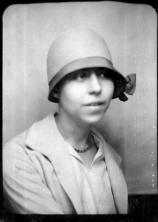Jezebel
Review
Jezebel
Few people over the age of 30 are happy about getting older, but not many of us take our fears to the extreme of Gladys Eysenach, the beauty-obsessed protagonist of JEZEBEL, Irène Némirovsky’s posthumous novel. Written in 1936, six years before Némirovsky and her husband died at Auschwitz, this novel is a portrait of a privileged woman who is terrified of losing her youth and who feels incomplete unless she is in a relationship with a younger man.
"Vintage International no doubt assumed that many of the readers of [SUITE FRANÇAISE] would buy this one, too, and they’re probably right. Beyond that, one can see that a story about a woman confronting the cruelties of old age might resonate with many people..."
It’s 1935, and 60-year-old Gladys is on trial in Paris for the murder of Bernard Martin, a 20-year-old student thought to be the latest of her many paramours. The long prologue chronicles the trial and introduces witnesses who will figure prominently in the long flashback that is the remainder of the novel. Her guilt is never in question, but what we don’t know --- and what the prosecution never succeeds in unearthing --- are the real circumstances that led Gladys to kill Martin at five in the morning after a late night with her lover, Count Aldo Monti. Nor does the prosecution ever come close to discovering the devastating secret that Gladys and Martin share.
Flash back 40 years. Gladys is 20 and attending a society ball with her older cousin, Teresa, whose husband, Claude, stops just short of declaring his love for his younger relation. After Gladys has an affair with a Count Tarkovsky, she marries the wealthy banker Richard Eysenach, who dies in 1912 and leaves her alone to raise their daughter, Marie-Thèrése.
Gladys is not a loving mother. Her main emotion toward her daughter is jealousy, especially when Marie-Thèrése turns 18. Gladys, now 40, resents her daughter’s youth and promise, so much so that she tells people that her daughter is only 15 --- too immature to date, and too young to have a child and turn Gladys into a grandmother.
But that doesn’t stop Marie-Thèrése from falling in love with Olivier Beauchamp, Claude and Teresa’s son. Gladys tells her daughter that she must wait three years before marrying. Despite her mother’s order, Marie-Thèrése becomes pregnant with Olivier’s child. Gladys’ response to the news is to take drastic measures to hide the truth of her daughter’s predicament and, in doing so, preserve the illusion that she, Gladys, is still a young beauty. But she goes too far, and a fateful decision involving Marie-Thèrése’s child brings Gladys’ fantasy of eternal youth to a terrifying end.
When reviewing a novel, or even just when reading a book for pleasure, it’s useful to try to understand why a book got published. In this case, one of the reasons is that SUITE FRANÇAISE, Némirovsky’s posthumous novel from 2006, was a bestseller. Vintage International no doubt assumed that many of the readers of the earlier success would buy this one, too, and they’re probably right. Beyond that, one can see that a story about a woman confronting the cruelties of old age might resonate with many people, especially those women (and perhaps men) who prize youth and beauty above all else.
But the treatment of this material in JEZEBEL is simplistic. As in most melodramas, the characters are one-dimensional. Gladys does little besides fret about her fading beauty and scheme to convince herself and others that she will be forever vivacious. Not much distinguishes the men in Gladys’ life from each other, except for one who is pure evil --- bitter, angry, resentful, and hell-bent on exacting revenge. There’s no shading to his character.
And much of the prose is over the top. More than once, Gladys’ “delicate nostrils” flare. The Presiding Judge (Némirovsky’s capitalization) asks a witness, “Can you tell us about the night before the crime, the Christmas Eve dinner that was to end so tragically?” The defense attorney tells a female witness, “Did your mistress love Count Monti? Please reply using your woman’s instincts.” Gladys “loved it when [her husband] caressed her roughly, savagely.” Later, she asks, “Was there anything better in life, was there anything more sensual than being attractive?” The writing is like this throughout and saps the novel of any power it otherwise might have had.
Stories about aging can be poignant and thoughtful, but only if they rise above the formulaic. Otherwise, they’re as misguided as men and women who resort to extreme measures in the hope that they’ll never get old.
Reviewed by Michael Magras on May 25, 2012
Jezebel
- Publication Date: May 1, 2012
- Genres: Fiction
- Paperback: 208 pages
- Publisher: Vintage
- ISBN-10: 0307745465
- ISBN-13: 9780307745460




